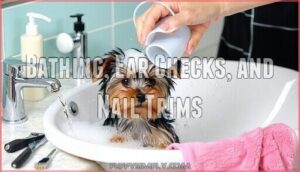This site is supported by our readers. We may earn a commission, at no cost to you, if you purchase through links.

Stock up on high-quality puppy food with real meat as the first ingredient, plus grooming tools like pin brushes and nail clippers. Your tiny companion faces unique health risks like hypoglycemia, so frequent feedings and monitoring are vital.
Daily brushing prevents coat matting, while regular vet check-ups and vaccinations protect against breed-specific conditions. House training requires patience and consistency. The secret to success lies in understanding these breed-specific needs and creating the perfect environment.
Table Of Contents
- Key Takeaways
- Must-Have Supplies for Your New Yorkie
- Yorkie Health and Wellness Essentials
- Grooming and Nutrition Tips for Yorkies
- Training and Socialization for Yorkie Puppies
- Creating a Safe and Enriching Home Environment
- Frequently Asked Questions (FAQs)
- How can I prevent my Yorkie from developing separation anxiety?
- What are the common health issues that Yorkies are prone to?
- Is pet insurance necessary for a Yorkie?
- How often should I groom my Yorkie?
- How much do Yorkies typically cost to purchase?
- What age should I adopt my Yorkie puppy?
- Do Yorkies get along with young children?
- How do I choose a reputable Yorkie breeder?
- Can Yorkies live in apartments or small spaces?
- Conclusion
Key Takeaways
- You’ll need essential supplies before bringing your Yorkie home, including a secure 24-inch high playpen, washable bedding, size-appropriate toys, high-quality puppy food with real meat, and grooming tools like pin brushes and nail clippers.
- Your Yorkie faces unique health risks like hypoglycemia, so you must establish frequent feeding schedules (3-4 small meals daily), monitor for warning signs like weakness or shivering, and keep emergency glucose sources like honey readily available.
- Daily brushing prevents coat matting, while consistent house training requires patience and a schedule of outdoor trips every 2-3 hours after meals and naps, plus thorough accident cleanup with enzyme cleaners.
- Early socialization between 3-14 weeks prevents behavioral issues, and you’ll need to create safe indoor exercise zones while puppy-proofing your home by securing electrical cords, removing toxic plants, and blocking escape routes.
Must-Have Supplies for Your New Yorkie
You’ll need the right supplies before bringing your tiny Yorkie home to guarantee their safety and comfort. Essential items include a secure playpen, appropriate bedding, grooming tools, high-quality puppy food, and size-appropriate toys that support their development.
Safe Playpen and Bedding Options
Your Yorkie puppy needs a secure playpen that’s at least 24 inches high to prevent escape attempts. Choose washable bedding materials like fleece or cotton that resist chew damage. Look for portable, easy-to-clean options with rounded corners. Avoid materials with loose threads that could pose choking hazards.
A well-sized playpen gives your Yorkshire terrier a safe space to rest and play. You can easily find a Yorkie puppy playpen online.
Puppy-proofing Your Home
Before bringing your Yorkshire Terrier puppy home, secure electrical cords and remove toxic plants like lilies and azaleas. Store cleaning supplies in locked cabinets and pick up small objects that could cause choking.
Block escape routes under furniture and behind appliances.
Move dog food and dog treats to puppy-safe heights to prevent overeating.
Essential Grooming Tools
Quality grooming tools transform coat care from a chore to bonding time. Your Yorkie’s silky coat needs specific equipment for proper maintenance and health.
- Pin brush with soft bristles – Gently detangles without breaking delicate hair strands
- Small nail clippers designed for toy breeds – Prevents painful overgrowth and splitting
- Gentle ear cleaning solution – Removes wax buildup that causes infections
To keep their coat healthy, consider using a pH-balanced shampoo.
Healthy Food and Feeding Supplies
Your Yorkie’s nutrition forms the foundation of their health. Choose high-quality dog food with real meat as the first ingredient. Establish a consistent feeding schedule with proper portion control to prevent hypoglycemia. Consider food allergies when selecting diet options. Proper nutrition can be achieved with quality Yorkie puppy food. Use stainless steel water bowls for hygiene. Stock healthy dog treats with variety for training rewards.
| Feeding Item | Recommended Type | Purpose |
|---|---|---|
| Dog Food | High-protein, small kibble | Meet diet requirements |
| Water Bowls | Stainless steel, elevated | Proper hydration |
| Measuring Cups | 1/4 and 1/2 cup sizes | Portion control |
| Treat Container | Airtight storage | Maintain freshness |
| Food Mat | Non-slip silicone | Clean eating area |
Toys and Enrichment Items
Mental stimulation prevents boredom-induced destructive behaviors in your Yorkie puppy. Puzzle toys challenge their intelligence while interactive games strengthen your bond during training sessions.
Rotate chew toys weekly to maintain interest and protect small teeth. Plush comfort items provide security when you’re away.
This rotation strategy keeps fun activities fresh for Yorkies while supporting proper development through engaging play.
Yorkie Health and Wellness Essentials
Your Yorkie’s health needs careful attention from day one, especially since these small dogs face unique medical challenges like hypoglycemia and dental disease.
You’ll need to understand common health issues, establish preventive care routines, and prepare for potential emergencies to keep your tiny companion thriving.
Hypoglycemia Prevention Tips
Protecting your new companion from dangerous blood sugar drops requires vigilant attention and smart planning. Yorkie puppies face serious hypoglycemia risks due to their tiny size and rapid metabolism, making prevention your top priority.
Essential Hypoglycemia Prevention Steps:
- Frequent Feedings – Feed your Yorkie puppy 3-4 small meals daily, with consistent timing to maintain stable glucose levels.
- Puppy Monitoring – Watch for early warning signs like weakness, shivering, or stumbling that signal dropping blood sugar.
- Supplement Options – Keep Nutri-Cal handy for quick energy boosts during stress or appetite loss.
- Emergency Glucose – Stock honey or corn syrup for immediate gum application during hypoglycemic episodes.
Recognizing symptoms early prevents life-threatening emergencies in your Yorkie’s health journey. A blood test can confirm the presence of low blood sugar.
Common Yorkie Health Issues
Yorkshire Terriers face several breed-specific health challenges that require your attention. Patellar luxation affects up to 25% of small dogs, causing kneecap dislocation and limping. Tracheal collapse creates that distinctive "honking" cough you’ll recognize. Eye problems like cataracts and progressive retinal atrophy can threaten vision. Liver shunt impacts 0.6-2% of Yorkie puppies, while heart disease and dental issues remain common concerns throughout their lives. Their small mouths can lead to significant dental problems, so regular cleaning is essential.
| Health Issue | Symptoms | Management |
|---|---|---|
| Patellar Luxation | Limping, abnormal gait, pain | Weight control, surgery if severe |
| Tracheal Collapse | Honking cough, breathing difficulty | Collar use, avoid excitement |
| Eye Problems | Cloudy eyes, squinting, tearing | Regular eye exams, genetic testing |
| Liver Shunt | Stunted growth, disorientation | Blood work, possible surgery |
| Heart Disease | Fatigue, coughing, difficulty breathing | Regular vet monitoring, medication |
Importance of Pet Insurance
Since emergency vet bills can exceed $1,000, pet health insurance becomes your financial safety net for Yorkie health issues. Coverage options usually reimburse 70-90% of costs for breed-specific conditions like collapsed trachea and dental disease.
Compare policies carefully, noting pre-existing conditions exclusions and claim process requirements. Most Yorkshire Terrier health problems qualify for coverage when enrolled early, making insurance essential protection.
Regular Vet Check-ups and Vaccinations
Schedule your Yorkie’s vet visits carefully—they’re your first line of defense against Yorkshire Terrier health issues. Annual or biannual visits allow your vet to monitor your dog’s health, administer vaccinations, and identify potential problems before they become serious.
Key vet care essentials include:
- Vaccination schedules starting at 6-8 weeks old
- Parasite prevention through regular screenings and treatments
- Dental cleanings to prevent tooth loss
- Heartworm testing annually or as recommended
- Senior care adjustments as your Yorkie ages
Grooming and Nutrition Tips for Yorkies
Your Yorkie’s silky coat and tiny size require specific grooming and nutrition strategies to keep them healthy and comfortable. Regular brushing prevents painful mats.
Proper feeding schedules help avoid dangerous blood sugar drops that can affect small breeds like yours.
Daily Brushing and Coat Care
Your Yorkie’s silky coat requires daily brushing to prevent tangles and mats. Use a pin brush or slicker brush for coat detangling, working gently through small sections. Grooming frequency matters—daily sessions keep your Yorkshire Terrier’s coat healthy.
Professional groomers recommend consistent brushing routines. Dog grooming becomes easier with practice, and seasonal shedding periods need extra attention for proper coat care. Regular brushing helps prevent coat matting issues.
Bathing, Ear Checks, and Nail Trims
Keep up with your Yorkie’s weekly baths using gentle dog shampoo, and don’t skip the ear cleaning every two weeks. Professional grooming every 4 to 6 weeks takes care of nail trimming, but you can trim nails at home using proper grooming tools.
Consider specialized Yorkie shampoos for their delicate coats. Regular tooth and nail care prevents painful issues from developing.
Balanced Diet and Supplements
Proper nutrition forms the foundation of your Yorkie’s health. Feed high-quality protein sources to support muscle development and coat shine.
- Choose premium dog food with real meat as the first ingredient
- Monitor portion sizes – ¼ to ⅓ cup daily prevents weight management issues
- Add omega-3 fatty acids for joint health and inflammation reduction
- Watch for Yorkie food allergies – symptoms include vomiting or diarrhea
- Maintain proper hydration importance with fresh water availability
Senior Yorkie diet requirements differ from puppies. Homemade Yorkie meals need veterinary approval to meet nutrition standards.
Dental Care Routines
Daily teeth brushing prevents Yorkie breath odor and addresses tartar control methods before bacteria builds up. Use dog-safe toothpaste and a soft brush, making it part of puppy teething care. Professional cleanings should happen yearly to prevent dental disease.
| Care Type | Frequency |
|---|---|
| Daily brushing | Prevents tartar buildup |
| Dental-Friendly Treats | 2-3 times weekly |
| Professional cleanings | Once yearly |
| Yorkshire terrier checkups | Every 6 months |
Training and Socialization for Yorkie Puppies
You’ll need to start training and socializing your Yorkie puppy right away since these intelligent dogs learn quickly and benefit from early guidance. Proper socialization helps prevent behavioral issues like excessive barking and separation anxiety, while consistent training builds the foundation for a well-behaved companion.
House Training Basics
Training your Yorkie puppy requires patience and consistency. Establish a potty training schedule with frequent outdoor trips after meals and naps. Crate training provides a safe space while preventing accidents. Clean accidents thoroughly to prevent marking behavior and maintain positive reinforcement during exercise training sessions.
- Set consistent feeding times to predict bathroom needs
- Take puppies outside every 2-3 hours and after activities
- Use enzyme cleaners for thorough accident cleanup
- Reward successful outdoor elimination with treats immediately
Socialization With People and Pets
Your Yorkie’s social development shapes their temperament for life. Early socialization between 3-14 weeks prevents fear aggression and builds confidence around people and pets. Yorkies naturally bond with families but need exposure to children, cats, and other dogs. Multi-pet homes require supervised introductions to establish harmony.
| Socialization Focus | Key Benefits |
|---|---|
| Child Interaction | Gentle handling tolerance, reduced nipping |
| Multi-Pet Homes | Peaceful coexistence, shared resources |
| Stranger Exposure | Confident greetings, reduced anxiety |
Managing Barking and Separation Anxiety
Barking solutions start with understanding anxiety triggers in your Yorkie’s environment. Yorkshire terrier temperament means they bark a lot, but consistent routines help manage this behavior.
Training techniques like ignoring attention-seeking barking and rewarding calm moments work best. Calming methods include mental stimulation through puzzle toys and gradual exposure to common triggers.
Regular exercise reduces restlessness-related vocalization in Yorkie behavior patterns.
Positive Reinforcement Techniques
Consistently rewarding good behavior works better than punishment for Yorkshire Terrier training. Your Yorkie’s high training aptitude responds well to consistent positive reinforcement techniques.
Use clicker training paired with treat rewards to mark correct actions immediately. Verbal praise and toy motivation help reinforce positive Yorkie behavior during training sessions.
Focus on shaping behavior gradually through small steps.
Creating a Safe and Enriching Home Environment
You’ll need to design specific areas in your home that support your Yorkie’s high energy levels while protecting their small, delicate frame from injury.
Creating the right environment means balancing mental stimulation with physical safety, especially since Yorkies can hurt themselves jumping from furniture or getting underfoot.
Setting Up Exercise and Play Areas
A dedicated exercise zone transforms your home into a Yorkie playground. Create safe indoor spaces where your pup can burn energy daily.
- Set up Indoor Agility courses using small hurdles and tunnels
- Rotate Puzzle Toys weekly to maintain mental stimulation
- Guarantee Outdoor Safety with secure fencing before yard play
- Schedule Interactive Games during high-energy periods
- Use a Rotation Strategy for toys to prevent boredom
This approach promotes healthy Yorkie Behavior and meets their Exercise needs effectively.
Safety for Small Dogs in Multi-pet Homes
Multi-pet households present unique challenges for your Yorkie’s safety. Supervision is key when mixing dog breeds with significant size discrepancies. Gradual introductions help prevent incidents between your small dog and larger pets. Yorkie temperament makes them fearless around bigger animals, increasing injury risk.
| Safety Strategy | Implementation |
|---|---|
| Safe zones | Use baby gates, crates for retreat spaces |
| Resource guarding prevention | Separate feeding areas, supervised toy access |
| Supervised play | Monitor all interactions until compatibility confirmed |
Adapting Your Routine for Yorkie Needs
Your Yorkie’s small size means schedule adjustments become your new reality. These tiny companions need frequent meals and bathroom breaks throughout the day.
- Feed every 3-4 hours to prevent hypoglycemia episodes that can be life-threatening
- Plan 15-minute exercise sessions twice daily for ideal Dog Exercise without overexertion
- Budget monthly grooming costs as part of your Financial Planning for Yorkie grooming needs
- Research pet-friendly accommodations early for Travel Considerations with your small companion
Consistent routines help your Yorkie feel secure while meeting their unique health requirements. Yorkies also thrive on affection, so remember to provide daily attention.
Long-term Commitment and Lifestyle Considerations
Before committing to a Yorkshire terrier, understand their 11-15 year lifespan means substantial financial costs and lifestyle changes.
These dogs require daily grooming, frequent vet visits for health issues, and consistent time commitment.
Travel considerations include pet-friendly accommodations or reliable care.
Yorkshire terrier personality demands attention and interaction, making dog maintenance a long-term responsibility requiring dedication.
Frequently Asked Questions (FAQs)
How can I prevent my Yorkie from developing separation anxiety?
Practice makes perfect when preventing separation anxiety. **Start with short departures, gradually increasing time.
** Keep goodbyes calm and low-key.
Provide puzzle toys with treats to create positive associations with alone time. Avoid letting your Yorkie follow you everywhere .
What are the common health issues that Yorkies are prone to?
Your Yorkie can face several health challenges. Watch for patellar luxation (kneecap dislocation), collapsing trachea, eye problems like cataracts, heart disease, hypoglycemia, and dental issues requiring preventive care.
Is pet insurance necessary for a Yorkie?
Given Yorkies’ costly health issues like patellar luxation and heart disease, pet insurance becomes a smart safety net. With lifetime costs around $18,615 excluding emergencies, coverage protects your budget when unexpected veterinary bills arise.
How often should I groom my Yorkie?
You’ll need to brush your Yorkie daily to prevent mats and tangles. Weekly baths, monthly nail trims, and regular ear cleaning keep them healthy and looking their best.
How much do Yorkies typically cost to purchase?
You’ll usually spend between $1,200 and $3,500 for a Yorkie puppy from a reputable breeder. Show-quality dogs can cost up to $5,000, while adoption fees run much lower around a few hundred dollars.
What age should I adopt my Yorkie puppy?
You should adopt your Yorkie puppy between 8-12 weeks old. This timing allows proper weaning, early socialization, and healthy development. Puppies younger than 8 weeks aren’t ready to leave mom yet.
Do Yorkies get along with young children?
With "little pitchers have big ears" in mind, Yorkies aren’t ideal for families with very young children since they’re fragile and easily injured during play.
They’re better suited for older, gentler kids.
How do I choose a reputable Yorkie breeder?
Look for health testing documentation, visit the breeding facility in person, ask for references from previous buyers, and verify AKC registration.
Quality breeders invest in health and genetic testing and provide health guarantees.
Can Yorkies live in apartments or small spaces?
When it rains, it pours with apartment perks for Yorkies. They don’t require a large yard and are perfectly happy in small spaces. You’ll need just thirty minutes of exercise daily to keep them content.
Conclusion
Successfully welcoming your new Yorkshire Terrier requires a mountain of preparation, but the rewards are immeasurable. Remember that yorkies everything you need to bring home your new yorkie centers on understanding their unique requirements.
These tiny companions thrive with proper supplies, consistent health monitoring, and patient training. Your dedication to creating a safe, enriching environment will establish the foundation for years of loyal companionship and joy together.
- https://www.dogster.com/lifestyle/essential-yorkshire-terrier-supplies
- https://www.reddit.com/r/Yorkies/comments/1d30951/new_puppy_supplies/
- https://www.yorkieinfocenter.com/yorkshire-terrier-list-of-supplies
- https://smoochie-pooch.com/yorkshire-terrier-care-grooming-bathing-health-tips/
- https://prettiestpuppies.com/dallas-puppy-health-checklist-setting-your-yorkie-up-for-success/


















